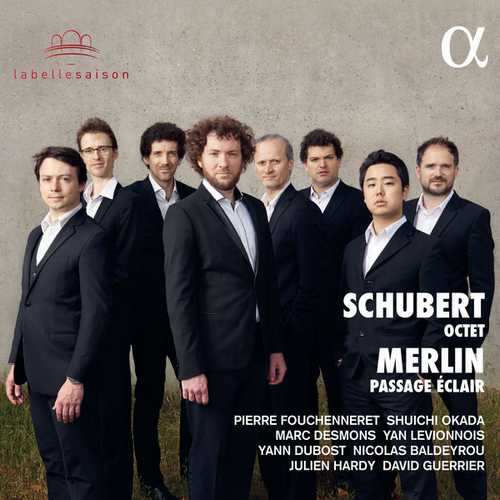
Composer: Raphaël Merlin, Franz Peter Schubert
Performer: Nicolas Baldeyrou, Julien Hardy, David Guerrier, Yann Dubost, Yan Levionnois, Shuichi Okada, Marc Desmons, Pierre Fouchenneret
Format: FLAC (tracks)
Label: Alpha
Release: 2020
Size: 2.23 GB
Recovery: +3%
Scan: yes
Raphaël Merlin:
01. Passage éclair
Franz Peter Schubert:
Octet in F major, D803
02. I. Adagio – Allegro – Più allegro
03. II. Adagio
04. III. Scherzo: Allegro vivace
05. IV. Andante – Un poco più mosso – Più lento
06. V. Menuetto: Allegretto
07. VI. Andante molto – Allegro – Andante molto – Allegro molto
Created in 2013 at the instigation of the Théâtre des Bouffes du Nord, La Belle Saison brings together several prestigious concert venues in a network hosting chamber music concerts. It also produces recordings. This programme – initiated by a group of friends and chamber musicians – was able to mature in the course of one of these residencies. Inspired by the unprecedented scoring of Beethoven’s Septet op.20, Schubert’s Octet D803 is an immense work of symphonic proportions. It was written just one year before the Ninth Symphony, known as the ‘Great C major’, composed in 1825, the last major orchestral work Schubert completed. The composer Raphaël Merlin, who is also a member of the Quatuor Ébène and a conductor, took Schubert’s Octet as his inspiration to write Passage Éclair: ‘In Schubert, three wind instruments act as a foil for five stringed instruments, which is in keeping with the laws of acoustics and dynamics, but nevertheless gives the ensemble a relatively dark colour. Thus we have the numbers 3, 5 and 8, evoking the Fibonacci sequence, which, like the golden section, underpins a very large number of works of the past and present. We engage with musical time in reference to the timespan of human life on earth and the acceleration of history…’